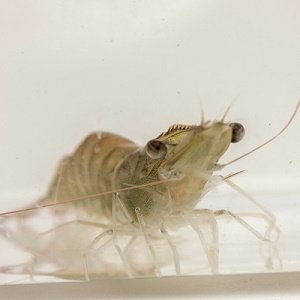
Vibrio parahaemolyticus is a major causative agent of acute hepatopancreatic necrosis disease (AHPND), which generates huge losses to the shrimp industry worldwide.
Control of AHPND is critical due to the worldwide expansion of antimicrobial-resistant V. parahaemolyticus isolates.
Researchers from Nguyen Tat Thanh University, Vinh Long University of Technology Education, Tra Vinh University, and HUTECH University studied the frequency of multiple antibiotic resistance (MAR) in V. parahaemolyticus isolated from AHPND whiteleg shrimp farmed extensively in the province. from Bac Lieu (Mekong Delta).
Prior to the study, the researchers interviewed shrimp farmers from 15 farms in Hong Dan, Phuoc Long and Vinh Trach Dong counties in Bac Lie province.
Vibrio parahaemolyticus isolates
“In this study, the detection of V. parahaemolyticus isolates in homogenates from the hepatopancreas and intestine indicate that this pathogen represents a risk for the shrimp sector,” they report.
According to the study, the survey results indicate that losses caused by AHPND infection range from 30 to 70%.
The study reports that the biochemical tests and the positive detections of toxR-PCR allowed the identification of 34 isolates of V. parahaemolyticus.
“In this study, 62.76% of the isolates were resistant to at least five of the tested antibiotics, and all the isolates showed MAR levels higher than 0.2. In addition, the majority of V. parahaemolyticus isolates exhibited resistance against selected β-lactam antibiotics (amoxicillin, 97.06%; ceftazidime, 100%; cephalexin, 44.12%),” the researchers described.
“It was closely followed by resistance against lipopeptides (colistin), where 73.53% of the isolates presented phenotypic resistance. For the other antibiotics tested, the isolates presented high resistance to erythromycin, with a resistance frequency of 64.71% (22 of 34 isolates)”.
Stay Always Informed
Join our communities to instantly receive the most important news, reports, and analysis from the aquaculture industry.
According to the researchers, the V. parahaemolyticus isolates may originate from the misuse and overuse of antibiotics to treat outbreaks of bacterial disease.
Antibiotic Susceptibility
The study reports that shrimp farms administer six different types of antibiotics for the treatment and prevention of disease in the early stages of rearing. Among them: amoxicillin was the most used antibiotic (73.33%), followed by ceftazidime (66.67%) and colistin (33.33%), while ciprofloxacin, oxytetracycline, and tetracycline were the least used.
“Antibiotic susceptibility examination revealed that most isolates were phenotypically multidrug-resistant, including resistance to ceftazidime (100%) and amoxicillin (97.06%), followed by colistin (74%) and erythromycin ( 65%)”, they report.
“Our antibiogram study revealed a relationship between the use of antibiotics in shrimp farms and the incidence of V. parahaemolyticus isolates resistant to the antibiotics used, with the exception of colistin,” they highlight.
Antibiotics effective against V. parahaemolyticus
“Our results suggested that the most effective antibiotic against V. parahaemolyticus isolates was doxycycline (94.12% of sensitive isolates), followed by flumequine (91.18%), florfenicol (73.53%), tetracycline (52.94%) and rifampicin (50%)”, they highlight.
However, the researchers cite, some chemotherapeutics are not recommended due to their serious negative impacts on human, animal, and environmental health.
Conclusion
“In this study, 34 bacterial isolates were recovered from diseased shrimp with AHPND, cultured in Bac Lie province. Based on a combination of microbiological culture and PCR assays, these isolates were identified as V. parahaemolyticus,” the researchers said.
They also indicate that based on the MARO analysis, evidence is provided that the irrational use of antibiotics in shrimp farms can result in a high presence of various MARPs in V. parahaemolyticus isolates.
“In particular, the high frequency of MARP detection in recovered and pooled isolates from different sampling time points supports the hypothesis of a transmission of antibiotic resistance caused by human activities,” they conclude.
Contact
Nguyen Thanh Luan
nt.luan@hutech.edu.vn
Department of Science and Technology,
HUTECH University
Ho Chi Minh City, Vietnam
Reference (open access)
Ha, P. T. H., Thi, Q. V. C., Thuy, N. P., & Luan, N. T. (2023). Multi-antibiotics resistance phenotype of pathogenic Vibrio parahaemolyticus isolated from acute hepatopancreatic necrosis disease in Litopenaeus vannamei farmed in the Mekong Delta. Journal of the World Aquaculture Society, 1– 18. https://doi.org/10.1111/jwas.12945
Editor at the digital magazine AquaHoy. He holds a degree in Aquaculture Biology from the National University of Santa (UNS) and a Master’s degree in Science and Innovation Management from the Polytechnic University of Valencia, with postgraduate diplomas in Business Innovation and Innovation Management. He possesses extensive experience in the aquaculture and fisheries sector, having led the Fisheries Innovation Unit of the National Program for Innovation in Fisheries and Aquaculture (PNIPA). He has served as a senior consultant in technology watch, an innovation project formulator and advisor, and a lecturer at UNS. He is a member of the Peruvian College of Biologists and was recognized by the World Aquaculture Society (WAS) in 2016 for his contribution to aquaculture.







